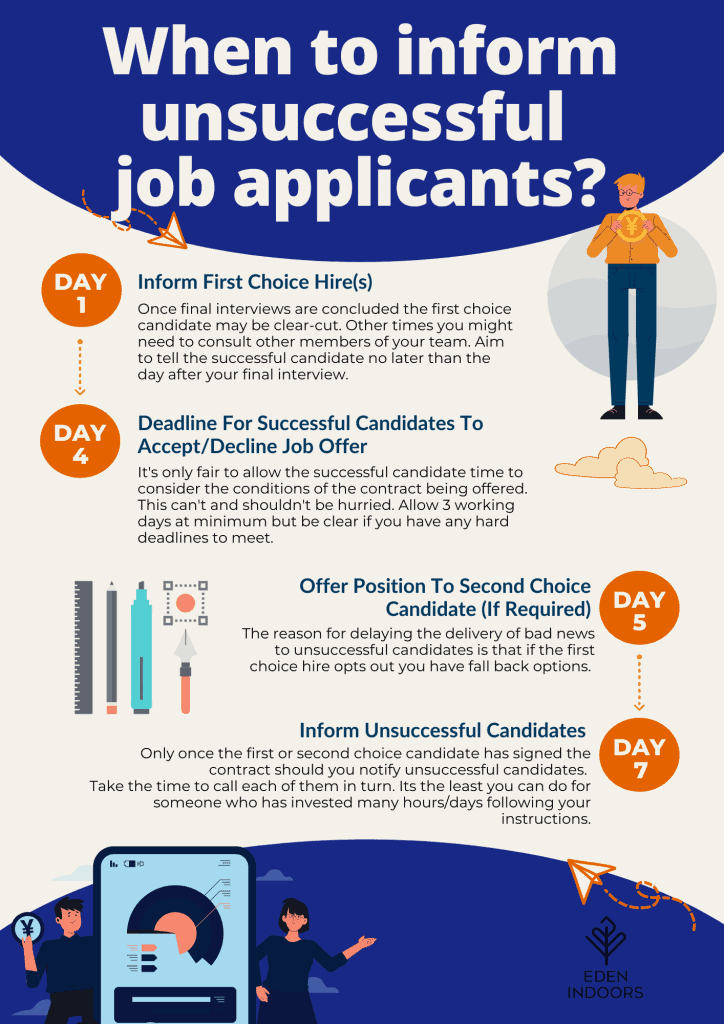Do You Tell The Unsuccessful Candidate First? [Hiring 101]
In the final stages of the hiring process you’ll very likely have whittled down the field of potential candidates from a stack of resumes, to a capable shortlist, to your first choice hire.
Following which comes the task of informing all applicants of the good – or bad – news.
Although informing unsuccessful applicants is something which could be completed immediately after the final interview has concluded to do so would be unwise.
It makes sense to inform your preferred hire of their success first as this candidate is not guaranteed to accept the terms of employment being offered. Having a shortlist of suitable candidates still expecting a call will offer you options to fall back on should your first choice pass up on the opportunity. Only after the contract has been signed and vacancy filled should you inform all other applicants they have been unsuccessful.
When should you notify unsuccessful candidates?
If it’s very clear that a candidate is unsuitable for the job being advertised, there’s no harm in providing notice that they have been unsuccessful as soon as the staged interviews are over.
For the individuals who make the shortlist, each of who would be very capable at filling the vacancy if it weren’t for someone slightly more qualified, you want to hold off providing the ‘unsuccessful notification’ until your first choice hire has accepted the contract on offer.
Timelines wise, try not to let any interviewee go without contact for longer than one week after the interview. Any longer than this and candidates might presume the position has been filled and will start to look for opportunities elsewhere.
A week should be ample time to speak with the successful candidate, receive back the signed contract and confirm that vacancy has been filled.

Of course, there are caveats to when you should inform unsuccessful applicants. There always will be.
One of the most common is when the first choice applicant is taking longer than expected to get back in touch to accept the offer.
If your first choice doesn’t acknowledge the award call/e-mail in short notice, it could be an indication that they don’t value the opportunity as highly as was made out during the interview, or that circumstances have changed since you last spoke.
Everyone has lives however so don’t get overzealous just because you haven’t heard back from them within the first 24hrs!
You can overcome this uncertainty on what is expected of each party with clear communication of timelines for next steps. I.e.. when interviewees can expect to hear from you, when additional interviews might take place. Just be sure to stick to any commitments which are shared.
If you’re stuck for ideas on how to round things off, here are a few recommendations on how to professionally close out the conversation.
Do you tell successful candidates first?
Not only does it feel good to deliver good news to successful candidates, it absolutely makes business sense to prioritize this task ahead of all other feedback provided to applicants.
Talented workers with valuable skill sets will likely have more than one job offer on the table, or at least be savvy enough to have expressed interest in multiple job openings at any one time.
To secure the desired hire as quickly as possible, and allow time to re-offer the position to a second choice candidate if required, successful candidates should always be notified first.
This is also most respectful to the alternate or second choice who might lose confidence in the company if they were informed they had been unsuccessful only for the hiring team to re-establish contact a couple days later after arrangements with the first choice hire falls through.
Wrapping up
Although letting unsuccessful interviewees know that you won’t be moving forward with their candidacy is something you could crack on with immediately post-interviews, this isn’t a good idea. Hold off a few days and only inform unsuccessful applicants after your preferred candidate has accepted.
Don’t leave them hanging for too long however.
Imparting a good impression on those candidates who are unsuccessful is crucial, as at some point in the future you might find they perfectly suit a new vacancy – and could save you a lot of time and energy going through the entire hiring process once again.


